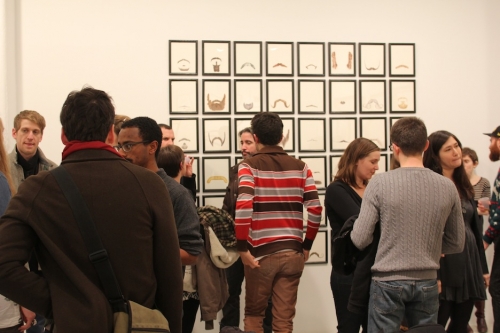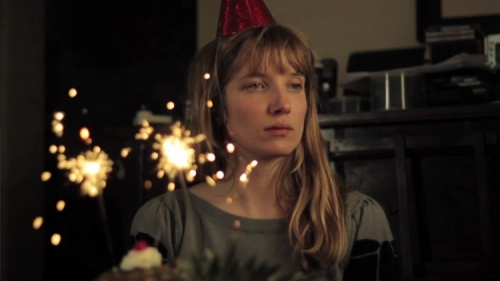
A New York Times review of Would It Kill You To Stop Doing That?, a new book on manners by Henry Alford, got me thinking about how much of my social grace I’ve gleaned from works of fiction. Beyond the more obvious social dramas of Austen or Fitzgerald, books can provide useful advice on how to act in certain situations—and warn of the consequences when certain behaviors are found undesirable.
I figured, if James could look to literature to gain a little perspective on zoophiles, I could consult the bookshelf to learn how to behave. What follows is a brief guide to help you get started.
- All little children should be given Cormac McCarthy’s The Road. Sure, it’s a little violent, but unimaginable horror never killed an eight year-old. The lesson here is embodied in the boy: at the end of days, walking around starving, the little guy hardly ever complains (or talks, for that matter), and he's spectacularly polite and loving towards his father. Does your kid whine about not getting the candy cereal at the grocery store? Hand him or her a copy. Maybe read it at night before they go to bed. See what happens.
- Do you know any sexual deviants who just need to shut up about it already? Give them a copy of Mary Gaitskill’s Bad Behavior. One of the beauties of Gaitskill’s short stories is how remarkably calm everybody is about how messed up their sex is. As uncomfortable and sometimes harmful as her characters can be, Gaitskill narrates in a way that shuts down all the annoying, gossipy shock value and allows the perverts to be precisely what they are: just humans.
- Even though it was published way back in 1962, I think Another Country by James Baldwin should be handed out to every white, liberal-leaning heterosexual along with their organic oats and fair trade coffee. Have you ever referred to someone else’s partner as their "roommate"? Do you decorate with the aim of exhibiting your knowledge of cultural difference? Maybe you’re super well-intentioned but don’t understand what all the fuss is about. Mr. Baldwin can tell you.
- Is there anything worse than the plethora of man-children running around today? Guys in their twenties and thirties shirking the responsibilities of career, family, haircuts, bathing. Maybe it’s time for a good look at one of the prototypes of the modern man-child: Rabbit, Run by John Updike. The book should be read not to shore up men's juvenile mindsets, but to show them that their very special feelings of entrapment and angst are anything but new. Besides, until you can narrate your life at the level of Updike’s prose, your angst won’t even get you any attention.
But the best reason to pick up a book of fiction? It might not even be the wisdom between the covers, but that your chances of fucking up decrease if your nose is stuck in one.
Image: tylershields.com

“Lauren Greenfield's film The Queen of Versailles … has generated alawsuit in advance of its opening-night premiere. [The] plaintiff distinguished himself by not suing over the film, but over the online proliferation of the associated press release. Specifically, the complaint stems from the film's blurb contained in the announcement of the festival's selections. The festival press release describes the film as showing a journey of 'rags to riches to rags.' It's those last 'rags'...that have infuriated plaintiff David Siegel.”—IndieWire, 12 Jan, 2012, Park City, Utah
“What was really affecting was the tenderness and earnestness of the poor people, who, in spite of the taxes with which they are overwhelmed, were transported with joy at seeing us. When we went to walk in the Tuileries, there was so vast a crowd that we were three-quarters of an hour without being able to move either forward or backward. The dauphin and I gave repeated orders to the Guards not to beat any one, which had a very good effect. Such excellent order was kept the whole day that, in spite of the enormous crowd which followed us everywhere, not a person was hurt. When we returned from our walk we went up to an open terrace and stayed there half an hour. I cannot describe to you, my dear mamma, the transports of joy and affection which every one exhibited towards us. Before we withdrew we kissed our hands to the people, which gave them great pleasure. What a happy thing it is for persons in our rank to gain the love of a whole nation so cheaply.”—Marie Antoinette, Letter to Marie Terèse, 14 June, 1770, Versailles, France
“One time, we flew commercial for some reason, and one of the younger kids asked, 'Mommy, what are all these strangers doing on our plane?' They are used to traveling on our private jet.”—Jacqueline Siegel, interviewed by Jana Waring in Playground Magazine, 19 March, 2009, Isleworth, Florida
Let Me Recite What History Teaches (LMRWHT) is a weekly column that flashes the lavalamp, gaslight, candlelight, campfire, torch, sometimes even the starlight of the past on something that is happening now. The form of the column strives to recover what might be best about the “wide-eyed presentation of mere facts.” Each week you will find here some citational constellation, offered with astonishment and without comment, that can serve as an end in itself, or an occasion for further thought or writing. The title is taken from the last line of Gertrude Stein’s poem “If I Told Him (A Completed Portrait of Picasso)."
Image: Dezeen

Could it be opposite day? Jocks are becoming nerds!
James Franco is flunking acting class!
But back in the normal world, Charlotte Bronte is still the most popular of her sisters
Nerds are pleased with the latest Batman trailer
And the masses have replaced planking with avocado-ing
Writers aren't having much luck though, as poet Carl Sanburg's home is being foreclosed
And Maya Angelou calls out Common for being "vulgar and dangerous"
While the writing world experiences a dearth of scathing wit with Christopher Hitchens's death
Similarly, The music world may soon be without the legendary talent of Etta James as well
World leaders have also been in the obits lately, with the deaths of Kim Jong-Il and Vaclav Havel
But there was one bright note this week: Aragorn has started his own indie publishing press!

Is it self-destructiveness or something worse that compels me to start off a post about Black Balloon's first reading, an evening of facial hair-inspired fiction that (full disclosure) I helped put together and (fuller disclosure) I also read at, by saying that I'm not the biggest fan of literary readings?
Read More
Kayla's lovely touchy-feely post about our current squeamishness when it comes to internet feelings got me thinking about how just the opposite's en vogue over in the Tumblr World of TeenGirldom. So I put together a list of text/image-confessional sites and had a good think about why they arouse my inner Humbert Humbert.
Read More
Marina Abramovic's nude, cannibalistic conception of this year's LA MOCA fundraising gala got me thinking about the most deliciously absurd gala digestibles of recent history. Feast on this...
Read More
When it comes to understanding art, the best intelligence I can muster compares to that of a wildly imaginative but heavily sheltered five year-old. Confronted with the work of someone like Maurizio Cattelan, whose retrospective is up at the Guggenheim through January, I’d rather not be alone with it. Someone else should be there, holding my hand, condescendingly telling me what the fuck to do with it.
I mean, I know all about the color wheel. The color wheel doesn’t faze me. Photographs are simps because photographs are immediate; they have beauty or depth or they don’t. But objects? I have to interact with objects? Immediately, upon encountering things constructed or appropriated as art, I assume there’s something going on—likely something obvious—that my wee brain has zero access to.
Image courtesy of artdatabank.blogspot.com
As much as I have this hesitating self-consciousness, I also suspect that intellect, in the face of art, doesn’t count for shit. And that my encounter with art, regardless of how much of an idiot I appear to be, should a) occur absolutely between myself and the art alone and not with a hand-holder and b) provoke a good deal of feeling. Art can provoke thought too, of course; thought’s okay and all, but it can’t only do that. I can bravely go forth and encounter art—even objects that are art—because it’s the art’s job to move me. Art has to seduce; it has to capture my attention with enough authority and grace for me to want to remain in the encounter for as long as possible.
Image courtesy of artdatabank.blogspot.com
If I were honest about my feelings toward Maurizio Cattelan, I would begin by confessing that I simply enjoy the sound of his name. Second, rumor has it he’s a bit of a hot mess who’s kind of consistently giving the art world the finger, which to me communicates charm. I was hesitant to encounter all of his work all at once; I would have preferred to take each piece on its own. Surprisingly, after the overstimulating first attack, which serves its own interesting purpose, I actually found that encountering the pieces all at once granted a sort of permission to peruse at leisure. I became more open to actually engaging with each individual piece because of the nonchalant, clusterfuck mess of it.
But most importantly, I have a hard time looking away from the elephant.
Image courtesy of artnet.com
I can’t get into the gamut of what happens in my heart and my head, because that’s between me and the elephant. All I can tell you is that I need to go look again, because the elephant hasn’t stopped the promise of telling me everything terrifying, everything beautiful.

After a 14-year hiatus, Beavis and Butt-Head has returned to MTV. Many fans of the “new” Beavis and Butt-Head are likely in their mid-thirties to early forties and are enjoying a bit of nostalgia from their high school and college years, when the show provided an easy excuse to do bong hits and invent drinking games (“Okay, every time Beavis says ‘Cool’ or ‘Dumbass’ or Butt-Head laughs you gotta fuckin’ drink”). Glory days. Now a new and younger generation can be indoctrinated to this infectious idiocy.
After watching several of the new episodes—sans bong & drinking games, but with a bottle of wine—I found myself wondering, Why? Yes, I still laughed my ass off. Yes, it was clever to include Beavis’ and Butt-Head’s commentaries on MTV reality shows (Jersey Shore, 16 and Pregnant, Teen Mom) in addition to music videos. But why is the show back? Why do we watch it? And what the hell does it say about us?
Knowing there probably isn’t some grand narrative answer to these questions (nor should there be), I came up with some existential qualities that characterize Beavis and Butt-Head—embarrassing, inappropriate values that make the show such a guilty pleasure.
Unfettered pleasure-seeking ids: Sex-obsessed, immature, unreflexive, irrational perverts. They never end up having sex, but their sole mission in life is to look at porn and try to score. Dr. Freud would be proud. “Hey Beavis, we need a chick that doesn't suck. No, wait a minute, that's not what I mean.” An ontology of primitive pleasure.
Naïve nihilists & myopic cynics: They truly don’t give a shit and are champions of schadenfreude. The world is nothing beyond whatever is directly in front of them. Everything else sucks. And they constantly beat the crap out of each other and destroy or burn whatever they find. “Damn it, all this wussy crap is pissing me off! C'mon, get violent! I wanna see some violence!” An ontology of nothingness.
Champions of sloth: Laziness rules, work is for losers, and their torn sofa is the center of their universe. “This sucks more than anything that's ever sucked before. We must find this butt-hole that took our TV.” An ontology of stasis.
Masterminds of ineptitude: All of their plans result in remarkable failure—and typically self-inflicted pain. “Dammit Beavis, what the hell are you doing? You're not supposed to have your penis out while you're cooking!” An ontology of masochism.
Beavis and Butt-Head is both a mocking condemnation and an exalting celebration of modern American adolescent stupidity. Immune to any type of moral reasoning, Beavis and Butt-Head offer glimpses into what the complete suspension of the ethical might look like. And rather than turn away in fear we tune in and laugh until we piss ourselves. But just a little bit.
Photo: Screen Junkies

Skwerl, an Australian short film in which gibberish mimics how English might sound to non-English speakers, recently wound up on Gawker and New York Magazine. The film is unremarkable subject-wise: a sort of mumblecore prose poem about an alt-attractive couple and a romantic dinner gone sour. So why did I find myself playing and...
Read More
As Russia marks the 20th anniversary of both the failed communist putsch to overthrow Gorbachev and, more notably, the collapse of the Soviet Union, Chicago is in the midst of its “Soviet Arts Experience”: a 16-month-long artistic celebration of arts created “under (and in response to) the Politburo of the Soviet Union.” Featuring music, dance, literature, theater, and visual arts, the Soviet Arts Experience is a festive orgy of Soviet culture.
Read More











 A Black Balloon Publication ©
A Black Balloon Publication ©